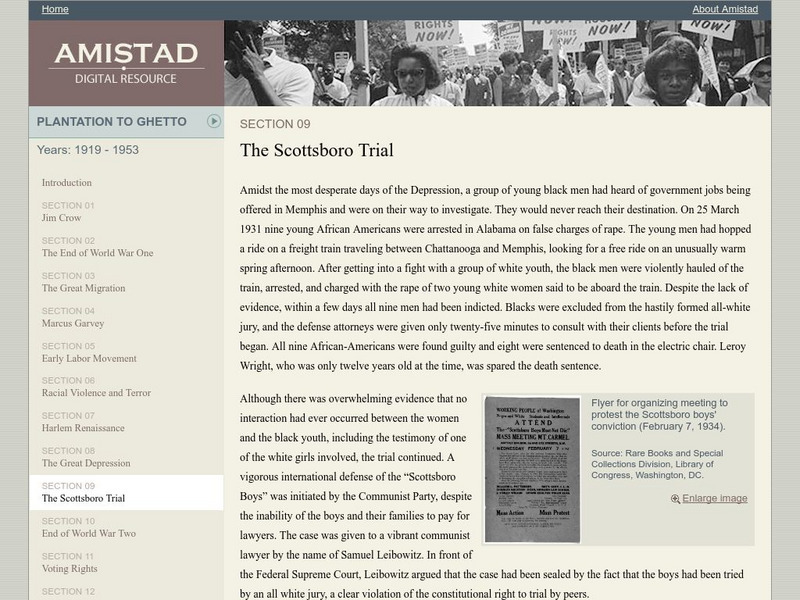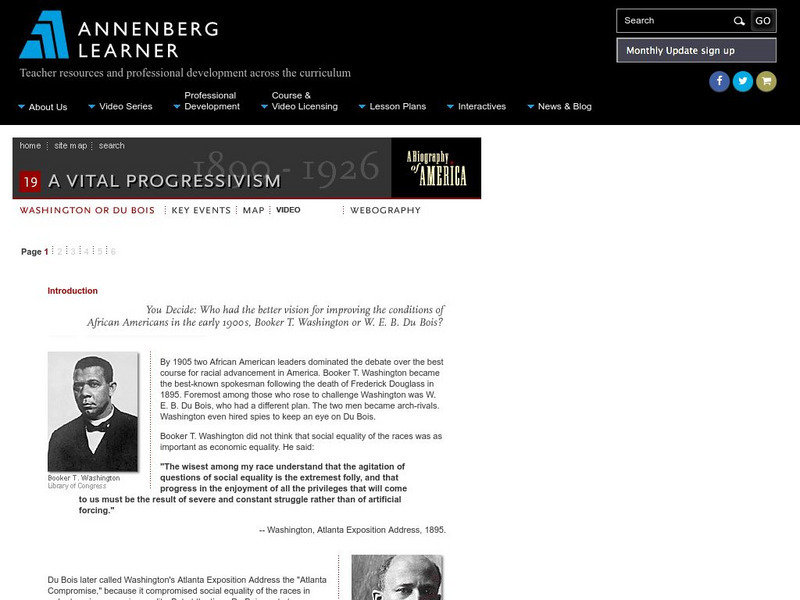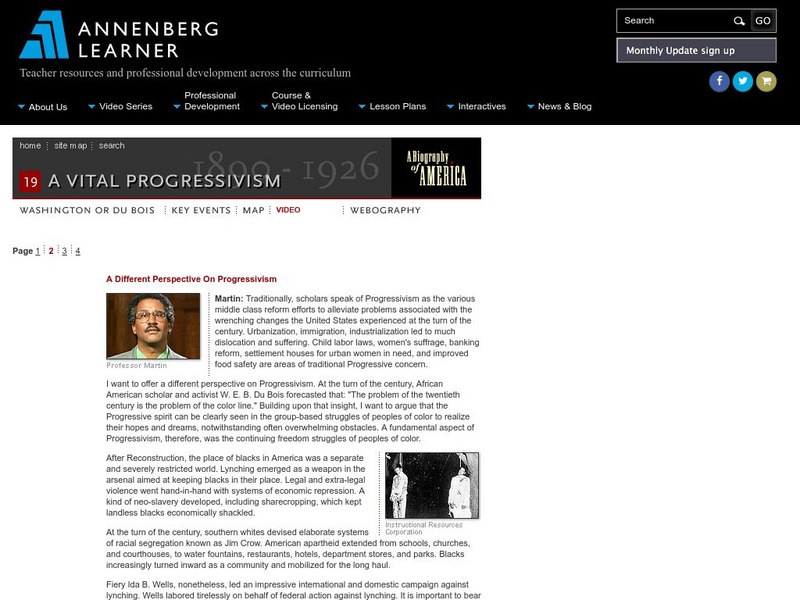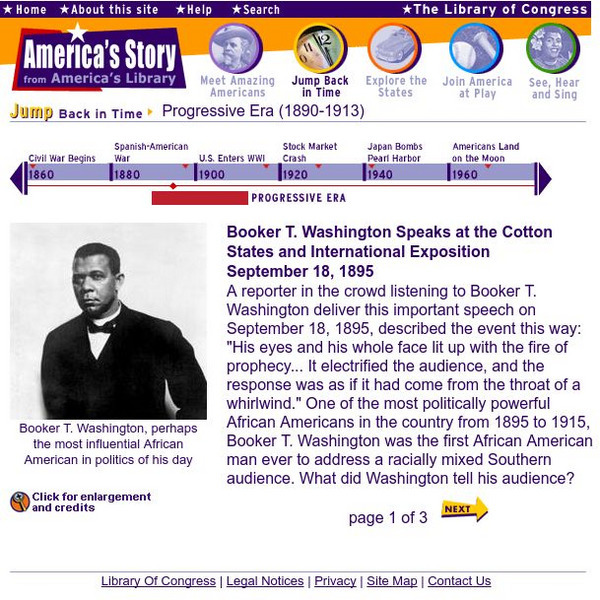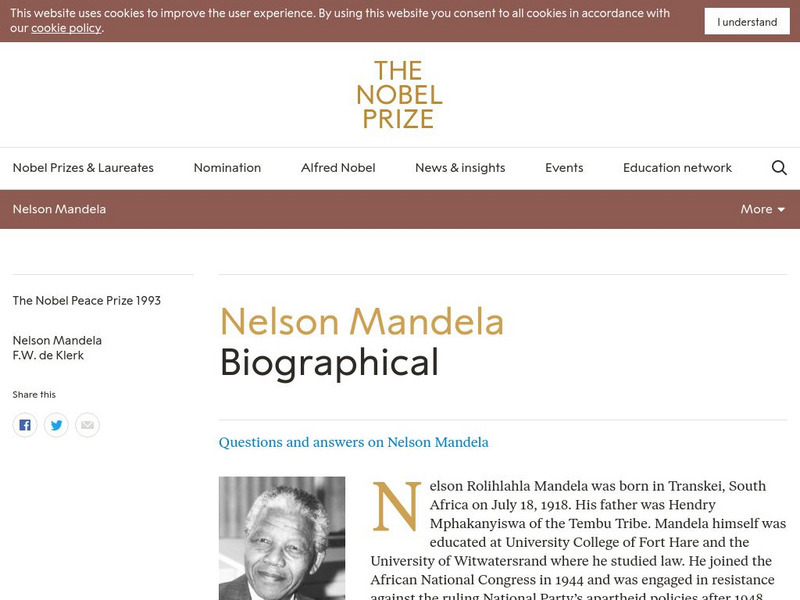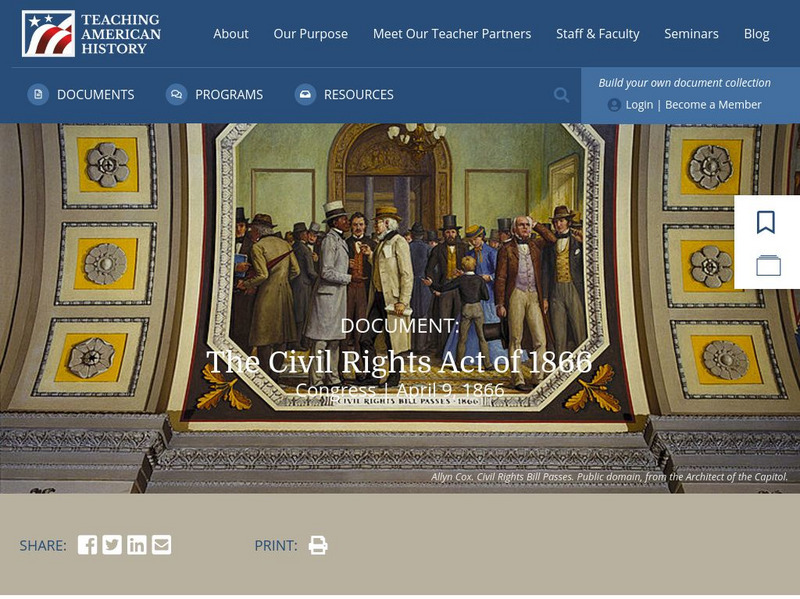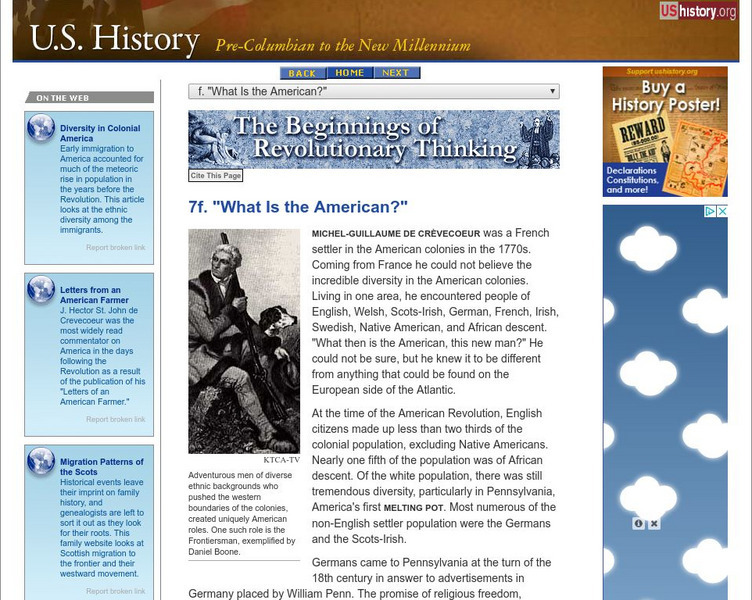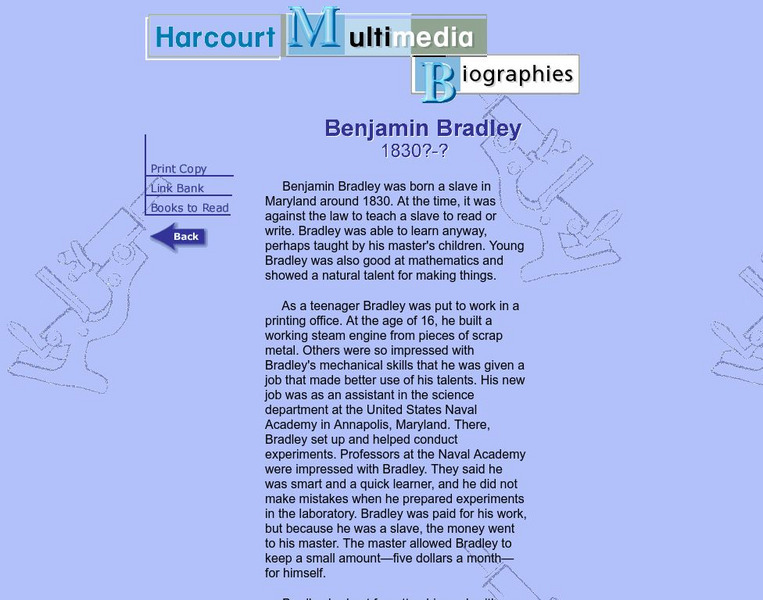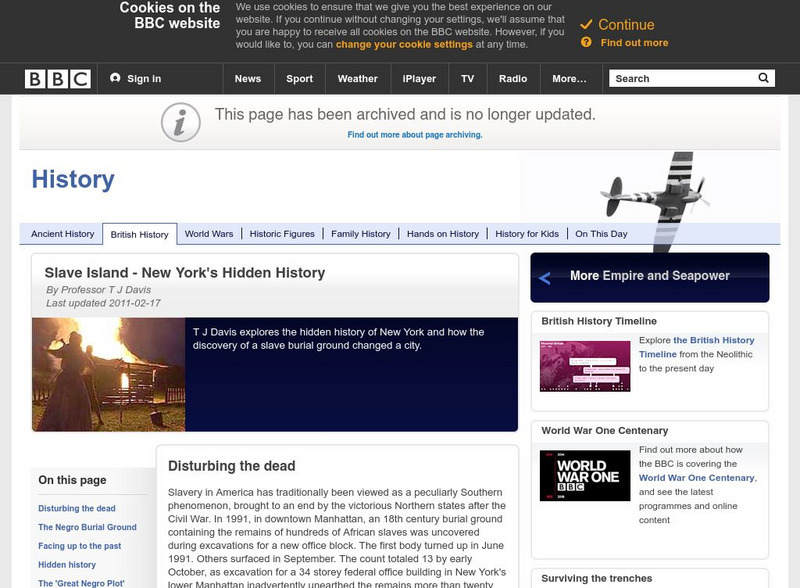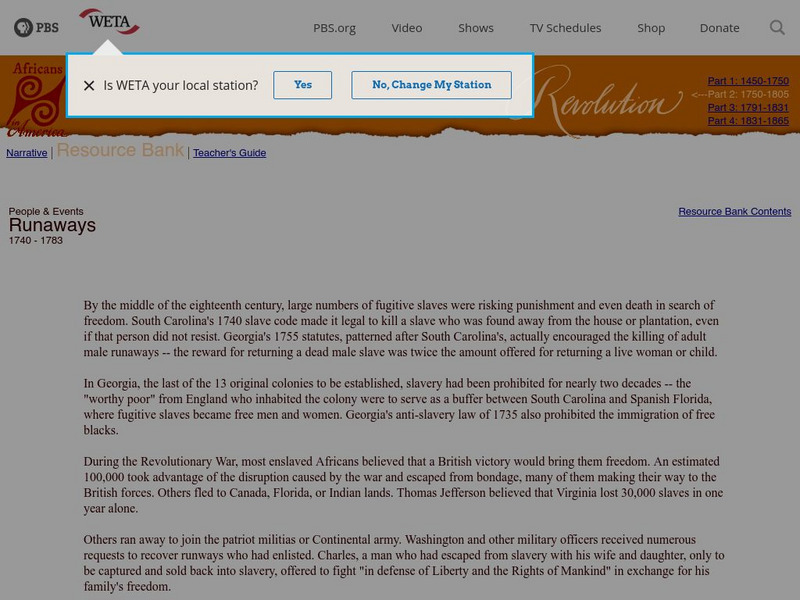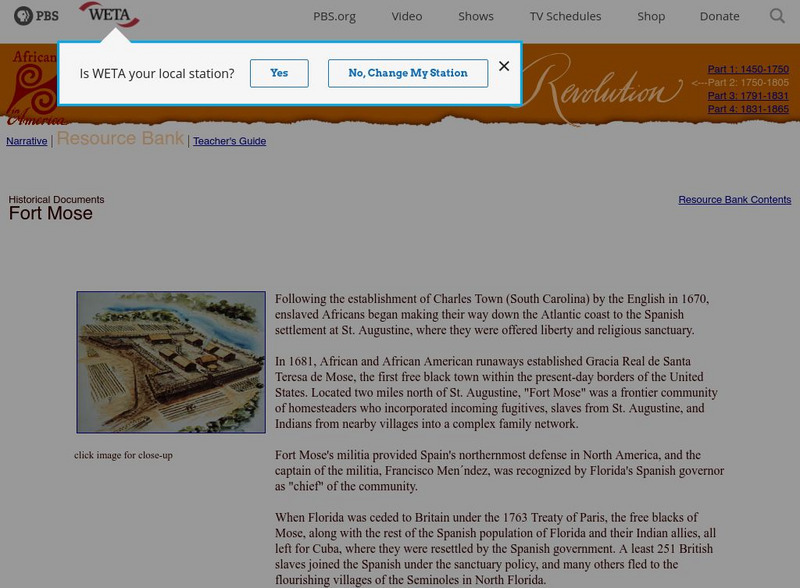Hi, what do you want to do?
PBS
Pbs News Hour: Interview With Secretary of State Rice
An interview conducted by Jim Lehrer. Topics included "Syria's presence in Lebanon, diplomatic efforts to end Iran's nuclear aspirations, the U.S. relationship with Europe, and her first months as America's top diplomat."
Understanding Slavery Initiative
Understanding Slavery Initiative: Atlantic Crossing: Slave Forts Case Study
Find out about the disparity between the castle-like headquarters of slave forts and the deplorable conditions in which enslaved Africans lived while waiting to be transported by slave ship to the Americas.
Other
Amistad Digital Resource: The Scottsboro Trial
Narrative examines the notorious trials of the Scottsboro Boys from 1931 through 1937 giving details about the prosecution, in Scottsboro, Alabama, of nine young African Americans charged with the rape of two white women. The trials...
Annenberg Foundation
Annenberg Learner: American Passages: Rhythms in Poetry: Claude Mc Kay
This is a succinct biography of Claude McKay, infamous Harlem Renaissance poet who expressed the need for the African American community in America to speak out against racism. See "Claude McKay Activities" for related materials.
Annenberg Foundation
Annenberg Learner: You Decide: Washington or Du Bois?
During the early Progressive Era, two leaders dominated the debate over the best course for racial advancement in America. Who had the better vision for improving the conditions of African Americans in the early 1900s, Booker T....
Annenberg Foundation
Annenberg Learner: Biography of Amer: A Different Perspective on Progressivism
Read this thought-provoking overview by historian Waldo E. Martin of progressivism as seen from the perspective of African Americans, Native Americans, and new Asian immigrants.
PBS
Pbs: Sweet Old Song (The Music of Howard "Louie Bluie" Armstrong)
Learn about and listen to jazz, blues, folk, and country musician Howard "Louie Bluie" Armstrong and his roots in America's musical past. "Sweet Old Song" tells the story of the music and art partnership between Armstrong and his...
Library of Congress
Loc: Booker T. Washington Delivered "Atlanta Compromise"
Booker T. Washington was one of the most influential African Americans of his day. This site highlights his famous "Atlanta Compromise" speech, as well as a general overview of his views.
Nobel Media AB
The Nobel Prize: Nelson Mandela Biographical
This brief biography from The Nobel Foundation on the life and struggles of Nelson Mandela, who, while in prison, "Was widely accepted as the most significant black leader in South America," includes several resources for further reading...
Teaching American History
Teaching American History: Document Library: Civil Rights Act of 1866
Read the complete text of the Civil Rights Act of 1866, which set out guarantees for citizenship in post-Civil War America as well as the punishments for those who tried to obstruct these guarantees.
Country Studies US
Country Studies: The Latino Movement
Latinos in the US, like African Americans, were oftentimes discriminated against and forgotten about. Noticing African American activist techniques for recognition, many Latinos in the US began to organize and pressure the government for...
Digital History
Digital History: Slavery and Spanish Colonization
Read about the slave trade and use of slaves in agriculture and mining in Spanish America in the New World. Find out why it was expedient to use African slaves.
PBS
Liberty: Chronicle of the Revolution: Diversity
A brief look at the population increase in colonial America. Find out where all these immigrants came from and what they did in the colonies. From PBS.
Independence Hall Association
U.s. History: Beginnings of Revolutionary Thinking: What Is the American?
Even colonial America was a melting pot of people from far away. Read about the diversity of the population and why it had an effect on the possibility of rebellion and revolution.
Houghton Mifflin Harcourt
Harcourt: Biographies: Benjamin Bradley
Learn about inventor and African-American slave, Benjamin Bradley, developer of a steam engine large enough to run the first steam-powered warship.
National Humanities Center
National Humanities Center: Teacher Serve: Religious Pluralism in the Middle Colonies
Essay looks at the phenomenon of religious pluralism in the middle colonies. Author discusses religious sects in New York, New Jersey, Pennsylvania, Delaware, as well as African Americans and Native Americans.
New Deal Network
New Deal Network: Journal of Negro Life: The New Deal and Housing
A 1934 article depicting the poor quality of housing in the larger cities of America and the Federal government's efforts to correct the problems.
BBC
Bbc: Slave Island New York's Hidden History
A fascinating article that examines the discovery in 1991 of a large Negro burial ground in lower Manhatten. The African American cemetery was used during the 18th century. Archived.
Other
Juneteenth.com: History of Juneteenth
Juneteenth.com discusses what Juneteenth is, its history, and its celebration. Content includes a look at why June 19, 1865, signifies the end of slavery in America, as opposed to Lincoln's Emancipation Proclamation of January 1, 1863.
CommonLit
Common Lit: Akron at Night by Teri Ellen Cross Davis
Teri Ellen Cross Davis is a poet who draws upon small, personal moments to explore large themes. Common subjects in her poetry include the experiences of women and people of color in America. This poem is from her 2016 collection Haint....
Yale University
Living Pictures Representing the History of Black Dance
A brief history of black dance in America, includes dance pioneers in jazz dance, ballet, and modern dance.
Alabama Learning Exchange
Alex: Com'on Down to Eatonville, Florida
You are Mayor Joe Starks from the book Their Eyes Were Watching God by Zora Neale Hurston, and you want more people to relocate to Eatonville, Florida. Identify five amenities that may make Eatonville attractive to African-Americans...
PBS
Africans in America: Runaways 1740 1783
This website gives a rough idea of how many slaves were present in the South and what happened to many who ran away.
PBS
Africans in America: Fort Mose
This website from PBS describes how Fort Mose was established by runaway slaves in Spanish Florida. It also explains what happened to the inhabitants after Spain lost control of Florida.







